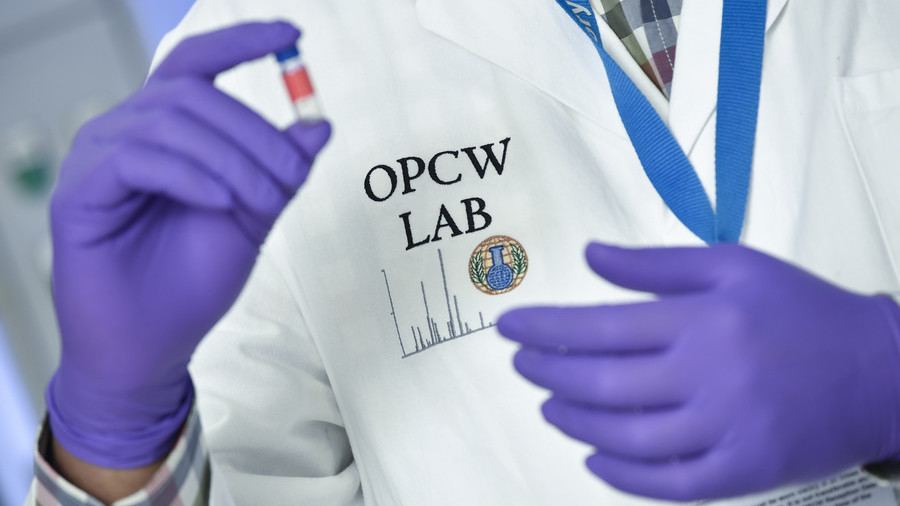OPCW: From Watchdog to Prosecutor
June 30, 2018 | Expert Insights

A UK-led proposal to grant the Organization for the Prohibition of Chemical Weapons (OPCW) with the power to name perpetrators of chemical attacks was passed on 27th June.
India backed Russia by voting against the draft.
Background
The modern use of chemical weapons began with World War I, when multiple parties to the conflict used toxic gas, causing more than 100,000 fatalities and 1 million casualties. At that time, chlorine, phosgene, and mustard gas were among the most used chemicals. Today, modern chemical weapons include nitrogen mustard, lewisite, tabun and sarin. The use of toxic gas during the early 20th century raised global demands to outlaw chemical weapons.
As a result, the Geneva Protocol for the Prohibition of the Use of Asphyxiating, Poisonous or Other Gases, and Bacteriological Methods of Warfare was signed in 1925. While an important step, the Protocol had a number of shortcomings, such as not prohibiting the development, production, or stockpiling of chemical weapons, and allowing states party to the Protocol to reserve the right to use banned weapons against non-member states. Thus, in 1992 the Chemical Weapons Convention (CWC) was created. As of 2013, 189 states are party to the convention “representing about 98% of the global population and landmass, as well as 98% of the worldwide chemical industry.”
The Organisation for the Prohibition of Chemical Weapons is the implementing body of the Chemical Weapons Convention (CWC), which entered into force in 1997. The OPCW work is centred around preventing the use of chemistry for warfare, destroying all existing chemical weapons, and monitoring chemical industry to prevent new weapons from reemerging, thereby strengthening international peace and security.
The entire stockpiles of India and South Korea have also been destroyed, as well as almost all of Muammar Gaddafi's stocks in Libya, and well over 90% of the vast US arsenal. However, critics believe the organisation should focus on preventing the development of new chemical weaponry instead of just destroying existing stockpiles. Moreover, it is yet to pressure nations that are still not party to the chemical weapons convention: Israel, Egypt, North Korea, Myanmar, Angola and South Sudan.
Analysis
The draft was passed with 82 in favour and 24 negative votes, exceeding the required two-thirds majority, at the fourth special session of the conference of the states parties to the Chemical Weapons Convention at the Hague. Before the vote, the organisation was only able to confirm whether or not the attack took place. It can now assign blame in its investigations.
UK Foreign Secretary Boris Johnson said it would "strengthen the ban on chemical weapons and prevent impunity for their use”. The UK government thinks the OPCW must adopt a higher profile, which would include the authority to identify the perpetrators, otherwise it will lose its relevance. The powers of attribution that are to be used initially in Syria will be strengthened and expanded at a later special conference in six months.
A number of OPCW reports have revealed growing concerns about non-declared chemical weapons (CW) activities in Syria, raising the prospect that Syria might be hiding illicit CW capabilities in violation of its accession to the Chemical Weapons Convention (CWC). An international OPCW-UN Joint Investigative Mechanism (JIM) released weak findings that chemical weapons were allegedly used in Syria in 2014 and 2015. However, it could not hold any single entity responsible for the use of the weapons; essentially it could not assign blame. The existence of non-state armed actors like ISIS, rebel fighters backed by US, and recognised states like Russia and Iran supporting the Assad government leaves an apparent grey area concerning warfare. While reports can conclude the existence of chemical weapons, it is far less easy to assign guilt to a single party or coalition for its deployment given the nature of the Syrian civil war.
Russia, Iran, and Syria voted against the UK proposal, while the US and the EU supported it. Moscow has repeatedly criticized the OPCW-UN Joint Investigative Mechanism (JIM) for mishandling its probes, cherry-picking evidence and using vague wording in its reports. Moreover, the CWC, serving as a legal basis for the OPCW, does not envisage any special mechanisms tasked with assigning guilt in case of chemical weapons use.
The proposal "will grant the director general, as an individual, unprecedented and unchecked powers. This lends itself to partisan use of the institution of the director general," India’s permanent representative to the OPCW, Venu Rajamony said in defence of his negative vote.
Moscow had warned that the changes in the OPCW mandate would turn it into a political tool as well as infringe upon the “exclusive prerogatives of the UN Security Council.” The OPCW was not created to carry out the functions of a prosecutor.
In Syria, the organization has not done its job efficiently, often failing to gather evidence at the site and using untrustworthy sources of information while preparing its reports. The OPCW-UN investigating team violated of the core principle of Chain of Custody and many provisions of the CWC took place last year during the investigations of the Khan Sheikhoun chemical attack, during which the inspectors did not travel to inspect Syria’s Shayrat air base. This was repeated during the 2018 attack in Douma.
It is important to note that there were no details regarding how the OPCW would be more transparent in their rulings to prevent politicisation.
Assessment
Our assessment is that move will not only undermine the UN Security Council, but will also be in violation of the Chemical Weapons Convention (CWC). We believe that the intention was to restrict proliferation of chemical attacks through accountability. However, we feel that it is not ethical for an investigative team to also pass judgement as prosecutor.








Comments